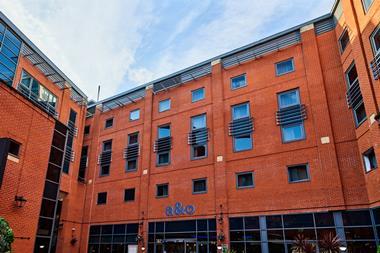An asset class in its own right, universities combine appealing defensive characteristics in these uncertain times with significant potential for future expansion. Richard Lowe reports
Student accommodation has become an asset class in its own right and is no longer a niche property market, according to a recent report by King Sturge. This is arguably true, but perhaps more important is whether during a time of market uncertainty pension funds flock to the sector for its potential defensive qualities or walk away in favour of more familiar core investments.
Investors have certainly been waking up to some very attractive characteristics, not least excellent rental growth prospects for student accommodation in the UK. These are driven by a healthy supply-demand imbalance, itself sustained by positive demographic trends and a burgeoning market for foreign students, coupled with a dire lack of accommodation that meets the needs of today's students.
Another is that demand for student accommodation is not proven to be correlated with the wider economy - people don't stop going to university because of an economic downturn - meaning that returns are likely to be less volatile, and may even be able to play a defensive role in times of uncertainty.
The UK market is by far the largest and most developed in Europe (For opportunities outside the UK, including the US, see following article.) The King Sturge report estimates the overall value of the student accommodation sector in the UK, as at September 2007, to be £202bn (€270bn), while there were £700m worth of transactions in 2007 alone. Exposure to the UK market can be easily accessed through a number of dedicated commingled funds, while other value-added commingled funds may carry some exposure to the sector.
Chris Mathew, fund director at Hermes Real Estate Investment Management, had been "tracking the sector" for a number of years before investing approximately £40m in it on behalf of two Hermes clients, a segregated pension fund and the Hermes Property Unit Trust.
"As a sector, it is certainly something that has been on our radar for some time," he says. "The reason for the slight hesitation in going into the sector was about trying to find the right sort of vehicle with a strong management team and portfolio of assets."
When UNITE brought out their student accommodation fund in 2006 - now the market's largest dedicated fund - Mathew had found his vehicle.
But why had Hermes been searching for a way into the market in the first place? "In a nutshell," Mathew explains, "it is one of those few areas of the market at the moment where there is still an imbalance between supply and demand.
"A large proportion of the stock is owned by universities and you still have relatively few commercially run halls of residence supplying those university towns. It is one of those classic situations where you have an undersupply of good-quality accommodation against a background of rising demand through growth in student numbers."
But what of the sector's non-cyclical nature? Is this seen as being as important as the demand-supply opportunity? Mathew believes this is an attractive characteristic and will "perhaps magnify the advantages" for institutional investors. But he states:
"Performance so far has been encouraging, but the bottom line is that it must continue to outperform if it is to justify an allocation."
M3 Capital Partners has played a key role in bringing institutional investment into the sector, including the UNITE student accommodation fund. UNITE vice-president Trishul Thakore certainly believes the perceptions investors have of student accommodation have evolved over the years. Traditionally, it was seen as an alternative investment class that was riskier than commercial real estate, but today's investors perceive it to be less risky, "because it is not driven by the factors that drive the rest of the economy, which makes it non-cyclical in terms of how rents and performance evolve over the business cycle", he says.
"Therefore people are understanding how that can play out in a defensive scenario and also how it can help generate cash-flows over a period of time without suffering the volatility that you do in, say, offices."
For this reason, Thakore is open to the suggestion that now could be a good time to gain exposure to the sector given the uncertainty and volatility affecting the mainstream property markets.
"I think so, particularly as there are questions around the office market, given the impact on financial firms through the credit crunch, and questions around retail, given the fact that interest rates and tax burdens are putting pressures on the consumer.
"This is one of the few asset classes, in the UK at least, where you could really build a strong story for good rental growth over the next few years."
However, Peter Hobbs, head of global real estate research at RREEF is not sure investors see student accommodation as anything other than an alternative type of real estate and suspects this will play against it during times of uncertainty.
"Although it has those underlying defensive characteristics, you might find investors hunkering down on to more core, prime-type real estate. There is a risk that investor appetite moves away from it, as with all alternative, secondary, emerging types of real estate right now."
Philip Jones, investment manager at the London Pensions Fund Authority certainly feels the negativity affecting the wider UK real estate markets may have diverted potential pension fund capital from student accommodation and other alternative sectors.
"Had the UK commercial market not imploded over the last six months from an investment point of view, I feel the more adventurous funds would have naturally gravitated towards this area, along with long-term residential care, because of the strong demographic underpinning and the higher yields available," he says.
There is another way for investors to lock into the UK's healthy demand and lack of supply of student accommodation, aside from investing in direct-let student developments. In fact, it is possible to argue that two divergent markets have emerged.
The UNITE model is to market high-quality accommodation directly to students at locations where demand is anticipated to be at its highest, capitalising on the inadequacy of existing university-run student halls and privately let residential properties to meet the demands of today's student population.
An alternative approach is to enter into long-term partnerships with universities themselves to manage student halls, as demonstrated by University Partnerships Programme (UPP).
Robert McClatchey, managing director at Barclays Private Equity, which has invested in UPP, explains that it focuses on "accommodation that is badged as university halls of residence and is primarily - but not exclusively - aimed at their first years."
As far as McClatchey is concerned, there are now two very distinct markets. "One is a student accommodation market and the other is a university accommodation market. For one your client is undoubtedly the student, for the other your client is really the university."
Thakore agrees it is possible to argue the existence of two distinct markets. "The UPP-type strategy, where you are working with a university, taking on long-term management outsourcing-type contracts, is very different and is akin to an infrastructure investment where you have a very fixed, probably inflation-linked income stream over a period of time.
"The UNITE strategy is very much driven by the underlying supply and demand for student accommodation."
Decisions around which route to go down will depend on what an investor ultimately requires. For Thakore, university accommodation offers "drier, lower-yielding" and potentially "safer" income streams, more akin to infrastructure investments, whereas student accommodation is "driven by pushing rents, benefiting from the demand-supply imbalance and asset managing the portfolio to drive performance".
McClatchey agrees that UPP's approach has more in common with infrastructure than it does necessarily with real estate, but also that it benefits from universities being able to provide "their partnership input and strength of offering".
He explains: "You are not talking about a model with freehold interests with unrestricted abilities to set rents at a purely market level, you are in a relationship with the university on a long-term lease - typically 35-50 years - where you have a different risk and return profile that is much more akin to infrastructure than it would be to more traditional property.
"We see a lower risk profile and a better long-term relationship for managing the risks in the sector by working with the university - for example, in many instances having them market the accommodation for us - than the risks and returns of direct-let."
Investing in university infrastructure as opposed to direct-let student accommodation also offers some interesting possibilities, including the potential to invest in more than just student halls.
UPP is already working on alternative uses for university accommodation outside term-time, particularly as universities are under increasing commercial pressure to maximise the income they generate. "You see a greater concentration on conference business and on the use of assets in the traditional vacation periods," says McClatchey.
But there is a potential for universities to begin exploring relationships with the private sector with a view to transferring operations of various parts of their estate, not just student accommodation.
"That is simply a reflection of what is going on in other parts of the public sector and the management of their assets," McClatchey says. "I think we will also see universities wanting to find solutions to upgrade their non-residential infrastructure. That is all part of the attraction of a partnership with a university, which isn't there in the direct-let student market."
Potential assets include lecture theatres, administration offices, research facilities or even the "more bespoke", such as leisure facilities.
In three to five years' time, McClatchey says, "that creation of a more mixed portfolio of university assets is certainly interesting and I see a significant attraction for institutions providing the capital and seeking returns from that".
Richard Collins, director for education and economics at DTZ, agrees that "there are a lot of opportunities to extend the approach that has been adopted for accommodation to other areas of university estate."
Collins is aware of a few examples "where it has already happened" and some examples where "it is currently being considered". Watch this space, he advises.
"My view is it is highly likely. The question will be: how quickly and in what areas? It won't happen across the university estate, but it will happen in certain areas of the university estate."However, McClatchey believes that institutional investment in non-residential university property would need to be diversified "across a number of universities" and not just with one single institution. Providing a pool of universities "is the challenge for the market", he says.
One possible vehicle could be a university REIT. There has already been talk of student accommodation REITs, but a tax-transparent vehicle offering exposure to a pool of university real estate would be an interesting prospect.
Simon Randall, partner at law firm LG, has been in a series of ongoing discussions with various UK universities about the possibility of establishing a REIT.
"I had met a number of universities that had expressed a view that provision of accommodation was not part of their core role in life - their core role being, of course, providing education - and there was therefore a level of interest in creating one of these vehicles," he reveals.
"Essentially, it would be accommodation that existing universities owned that they would be happy to sell to the REIT. Whether they would self-manage thereafter or it would be managed by the REIT was a matter for discussion."
However, the idea has stalled for the time being, given the current market volatility and a number of general issues regarding residential REITs "being dealt with by a lobby group".
"There is an appetite for this, but probably the timing is not right," Randall says.
Andrew Allen, head of research and strategy at Cordea Savills, agrees that currently "the market just isn't very favourable for it".
He continues: "In theory it makes lots of sense. Unfortunately, we are having a different economic reality at the moment. It would be an uphill struggle to list something so specialist into the market as it stands today."
Universities compete on quality of life
Lancaster University has been working with the University Partnerships Programme (UPP) to create a number of on-campus student accommodation developments. The project started in 2003 and by September 2008 will have produced approximately 4,500 new student beds.
Unlike its counterparts in London, Manchester or Leeds, for example, Lancaster University is not situated in or near an urban centre and therefore its campus accommodation is a vitally important part of its overall offering to prospective students.
"As a campus university, we have to make sure that what we offer is not only of very high academic quality, but also high quality in terms of the other facilities and services the campus has to offer," says Andrew Neal, director of finances and resources at Lancaster. "Students have to want to come here to study, but they also have to want to come here to live."
The decision to seek private sector development and investment followed a general recognition that the university needed to provide accommodation in a "consistent way" and that an upgrading of its residential offering was needed "very rapidly" if any negative reputational impacts were to be avoided.
"We decided, given the extent of the investment we had to make, it was going to be necessary for us to work with a private sector provider," Neal explains. "It was going to be beyond our direct resources in terms of investment and therefore a partnership approach was going to be the best thing for us."
However, Lancaster was keen to maintain "direct control" in the area of student contact, marketing and allocation regarding the accommodation, as opposed to comprehensively offloading all responsibilities to a third party.
"We are a collegiate university and we see immediate student contact and welfare responsibility as being very important to us. If you look at the proposed business models of some providers, they will operate alongside universities and in some cases in competition to universities' own facilities. We wanted a partnership approach whereby we would share different tasks."
The new developments are unusual in that they include ‘eco-friendly residences', which involve a low waste and energy efficient process. Wood used in the construction comes from sustainable managed forests and the buildings are highly insulated to conserve energy. The scheme also includes solar thermal panels on the roofs to heat water.
The benefits of this approach are twofold: the positive association with sustainable housing solutions for the institution (Lancaster University has major research areas in both the environment and design); and the lowering of production costs.
"From that point of view, there was an economic gain to be made as well as it being very congruent with the wider role of the university," Neal says.
The lower running costs have allowed for very competitive rents without compromising on quality - something, it seems, for which there is huge demand among Lancaster students.
"A lot of the very cheap landlords have fallen out of the market and have sold their properties on. Other landlords who have stayed in the market have invested in their properties behind what the university is doing," Neal says.
"So, actually the whole offering, between the university and the private sector in the city, has gradually upgraded over time."












